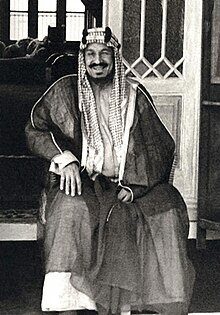Abdul Aziz Al Saud
| Full name | |
|---|---|
| Abdulaziz bin Abdul Rahman bin Faisal bin Turki bin Abdullah bin Muhammad bin Saud |
Abdulaziz ibn Abdul Rahman ibn Faisal ibn Turki ibn Abdullah ibn Muhammad Al Saud (Arabic: عبد العزيز بن عبد الرحمن آل سعود, ‘Abd al-‘Azīz ibn ‘Abd ar-Raḥman Āl Sa‘ūd; 15 January 1875 – 9 November 1953), usually known within the Arab world as Abdulaziz and in the West as Ibn Saud, was the first monarch and founder of Saudi Arabia, the "third Saudi state".
He reconquered his family's ancestral home city of Riyadh in 1902, starting three decades of conquests that made him the ruler of nearly all of central Arabia. He consolidated his control over the Najd in 1922, then conquered the Hejaz in 1925. He extended his dominions into what later became the Kingdom of Saudi Arabia in 1932. As King, he presided over the discovery of petroleum in Saudi Arabia in 1938 and the beginning of large-scale oil production after World War II. He fathered many children, including 45 sons, and all of the subsequent kings of Saudi Arabia.
Ibn Saud was born on 15 January 1875 in Riyadh in the region of Najd in central Arabia. He was the son of Abdul Rahman bin Faisal, last ruler of the Emirate of Nejd, the "Second Saudi State", a tribal sheikhdom centered on Riyadh. His family, the House of Saud, had been a power in central Arabia for the previous 130 years. Under the influence and inspiration of Wahhabi Islam, the Saudis had previously attempted to control much of the Arabian peninsula in the form of the Emirate of Diriyah, the "First Saudi State", until its destruction by an Ottomon army in the Ottoman–Wahhabi War in the early nineteenth century. Ibn Saud's mother was a member of the Sudairi family, Sarah Al Sudairi. She died in 1910.
...
Wikipedia

